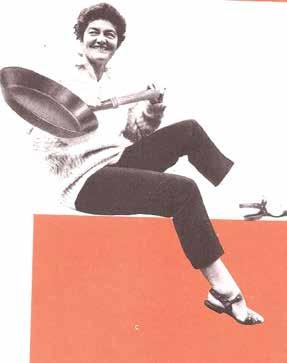
5 minute read
The Winnet Diary

ALTHOUGH A NAME IS
Advertisement
LARGELY FORGOTTEN NOW SHE WAS A LARGER THAN LIFE CHARACTER. SHE LIVED ONLY 47 YEARS BUT PACKED PLENTY OF ENDEAVOURS INTO HER SHORT LIFE. ALWAYS CONTROVERSIAL AND A STEP OUT OF LINE WITH THE ACCEPTED NORMS OF HER TIME SHE WOVE HER WAY THROUGH LIFE WITH VIGOUR AND VITALITY ENOUGH FOR SEVERAL PEOPLE. SHE WAS WHAT TODAY IS DESCRIBED AS BEING GAY. THE TERM LESBIAN WASN’T MUCH USED IN PUBLIC BACK IN THE 1950S AND ’60S; THE RATHER SILLY DESCRIPTION OF ‘LADIES IN TWEED’ WAS OFTEN QUOTED.
Why does she stick in my memory? Well if like me certain instances of a written or spoken phrase or a sight or a comment really bore home to you and carry a deep message way beyond the norm and make a change in your life then you’ll understand why. I read one of her books a long time ago. The title was “Thank you, Nelson”. It was the story of her service life in the WRNS during WW11. There was one particular short excerpt that I remember from the book that struck home with me. I took wisdom from an episode that concerned the time when, early in the war, she was engaged in trying to resupply the small coastal naval vessels along the East Coast of England. These ‘cockleshell warships’ went out to engage the enemy’s light coastal forces. When I write ‘resupply’ that’s something of a misnomer in that at that time basically there were no supplies to be had. Each day or so she would visit the little ships, get a long list from the crews and go off foraging in her small truck through all the depots and storage areas within driving distance. When after having used all her charm, threats and whatever persuasive talents she could muster on every store manager she had to drive home and disappoint ‘her boys’, the crews on the ships, it left her heartbroken. Then one day in desperation, carrying a large list of wants from her ‘boys’, she set off in a different direction. She came upon a new, as yet unvisited, stores depot. This place was under the command of an older Naval Officer. Responding to the “What do you want M’dear” greeting she sheepishly produced her lists. To her amazement, the officer ticked off everything she wanted and directed her to the loading area. Not believing what was happening and all the while expecting to be stopped, she loaded up in record time and beat a hasty exit. A few days later she chanced her luck again to be met with the same response. Her crews were over the moon; they were a fighting force again – she was a hero. After multiple visits, all with similar satisfactory results her curiosity got the better of her and she chanced her arm and asked the older officer why she could get everything she wanted from his depot and hardly anything at all from the other places. He rocked back in his office chair and said to her “Well my dear, I am of independent means”. To understand the answer and its implied meaning you should remember that the vast majority of naval officers relied entirely on their pay to sustain their families. If an officer took an action that was deemed by their superiors to be suspect in any way they
NANCY SPAIN
could face maybe demotion or restricted further promotion opportunities, all of which could affect their careers, life and income. Nancy’s helpful Captain had no worries in this direction so could give what he considered the little boats crew’s needed without fear for his own position. That I found to be a profound situation and it’s stayed with me ever since. Only someone unencumbered or not fearful of consequences can really make decisions based on honest needs. So never expect full truth, honesty or justice from anyone, except maybe close intimates because these things are probably not theirs to give. But, back to Nancy – what did she achieve, what were her claims to fame? She had a rather privileged upbringing. She was born in the North East of England and was sent to Roedeen School. She was very successful in sports, Hockey, Lacrosse, Tennis and Cricket. Very much the “Jolly Hockeysticks” kind of girl in a posh school; it was said that she dressed in ‘Mannish clothes’. Family connections included the famous Mrs Beaton who was her great Aunt. Nancy wrote a couple of books about the famous author later in her own life. During her time in the navy, she was commissioned. She ended her naval career in the London press office of the WRNS. She then joined the Daily Express and the News of the World as a correspondent after working as a sports reporter with a local Newcastle daily paper. After this she worked in radio as a presenter then transferred to Television where she starred for several years in a variety of national shows, all the while writing a range of books – detective stories and non-fiction works. She was admired, she moved in exalted circles. She was a personal friend of both Noel Coward and Marlene Dietrich. She lived openly with the woman editor of ‘She’ Magazine and also in an extended household that included Sheila Van Damm the rally driver who had been the former owner of the infamous Soho revue theatre ‘The Windmill”. Nancy did have an affair with a man, the husband of a friend and she may have had a son by him - she led the Bohemian lifestyle. She died in a light plane crash in 1964. All
BY: David Horrocks

the occupants were killed including her life partner – Jonny – the lady editor of ‘She’ magazine. They were on their way to attend and report on the Grand National Steeplechase horse race at the Aintree racecourse in Liverpool. Her friend Noel Coward wrote in his diary that night “It is cruel that all that gaiety, intelligence and vitality should be snuffed out when so many bores and horrors are left living”.










